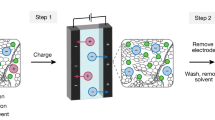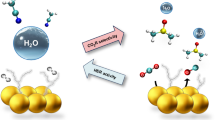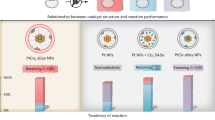Abstract
PALLADIUM significantly increases the reaction rate of graphite with oxygen in the 600°–700° C temperature range1. The activation energy for the catalysed reaction in this range is 124.5 kcalories/mole, however, compared with 48.8 kcalories/mole for the uncatalysed reaction, so the pre-exponential term A in the Arrhenius equation k = Ae−E/RT is correspondingly large. (In the equation k is the rate of reaction, E the activation energy and R and T have their usual identity.) This implies that the catalysed reaction takes place on surface sites which differ in both quantity and nature from those of the uncatalysed reaction.
This is a preview of subscription content, access via your institution
Access options
Similar content being viewed by others
References
Heintz, E. A., and Parker, W. E., Carbon, 4, 473 (1966).
Fryer, J. R., Siemens Review, 35, 13 (1968).
Hennig, G. R., Appl. Phys. Lett., 4, 52 (1964).
Hennig, G. R., J. Inorg. Nucl. Chem., 24, 1129 (1962).
Author information
Authors and Affiliations
Rights and permissions
About this article
Cite this article
FRYER, J. Oxidation of Graphite catalysed by Palladium. Nature 220, 1121–1122 (1968). https://doi.org/10.1038/2201121b0
Received:
Issue Date:
DOI: https://doi.org/10.1038/2201121b0
Comments
By submitting a comment you agree to abide by our Terms and Community Guidelines. If you find something abusive or that does not comply with our terms or guidelines please flag it as inappropriate.



